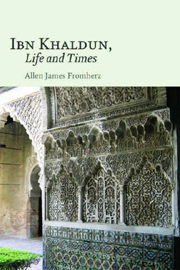2 - IBN KHALDUN'S EARLY LIFE
Published online by Cambridge University Press: 12 September 2012
Summary
Only when a strong wind was blowing did a faint, sickly odor coming from the East remind them that they were living under a new order.
Albert Camus, The PlagueThe world seemed to be plunged into primeval silence.
Paul Diaconus (d. c. 790)Some scholars have pronounced it impossible to write an ‘interesting’ biography of Ibn Khaldun. According to this assessment, Ibn Khaldun did not reveal anything truly personal, anything in the modern sense of what is expected in a proper biography: a psychological analysis of an individual. In the introduction to his monumental translation of the Muqaddimah, Franz Rosenthal noted that Ibn Khaldun rarely provided intimate biographical information. He barely mentioned his mother, siblings, and family, except when they were taken away by tragic events. Even pertinent information about Ibn Khaldun's psychological relationship with his contemporaries, was, in Rosenthal's view, extremely lacking. Although Ibn Khaldun's account of his life was ‘the most detailed autobiography in Medieval Muslim literature,’ a psychologically compelling work for Rosenthal it was not. Rosenthal thus warned against any attempt to write a complete biography of Ibn Khaldun beyond the dry, bare bones translation of his narrative. His warning has stuck. The only existing biographies of Ibn Khaldun are translations of Ibn Khaldun's autobiography or cursory discussions of the outlines of his life. There was a largely descriptive book by the scholar Walter Fischel on Ibn Khaldun's life in Egypt written in 1967, but it starts in 1382 and curiously leaves out the entire, formative first half of Ibn Khaldun's life.
- Type
- Chapter
- Information
- Ibn KhaldunLife and Times, pp. 39 - 59Publisher: Edinburgh University PressPrint publication year: 2010



